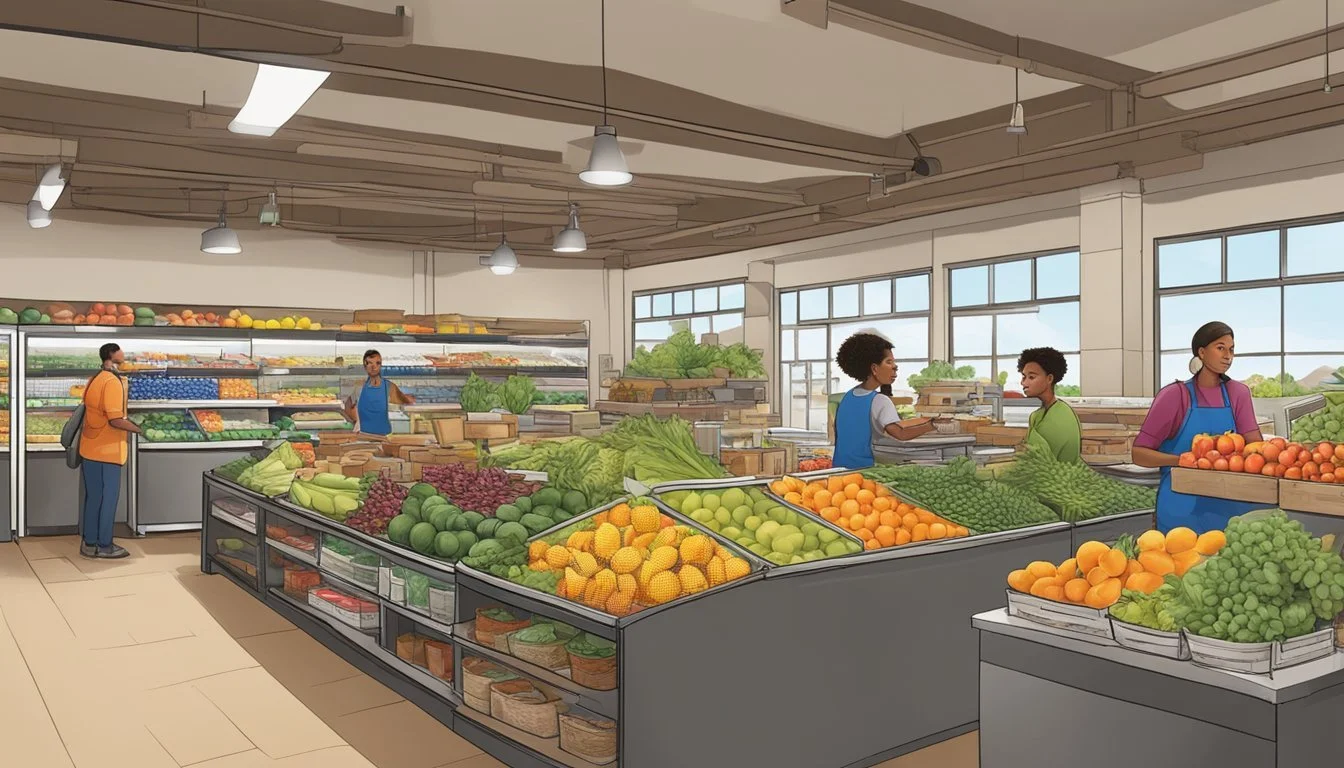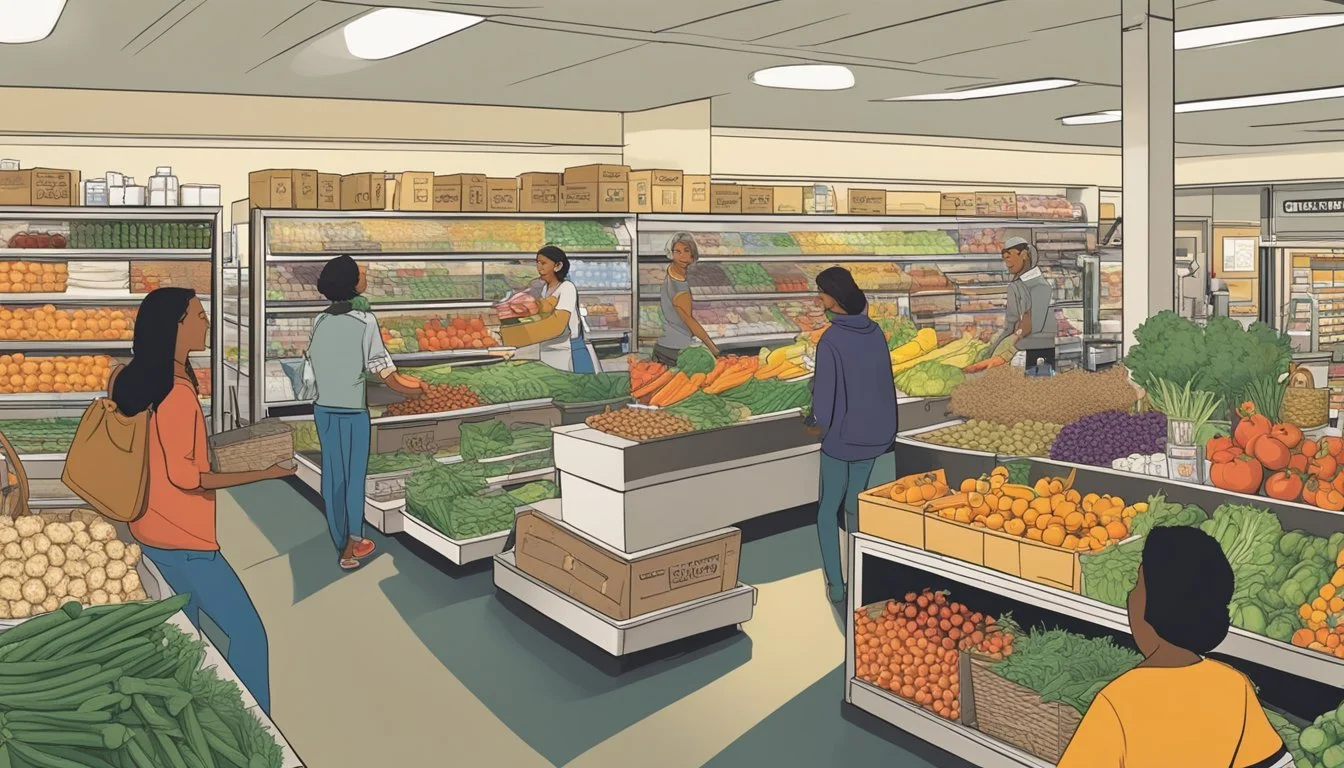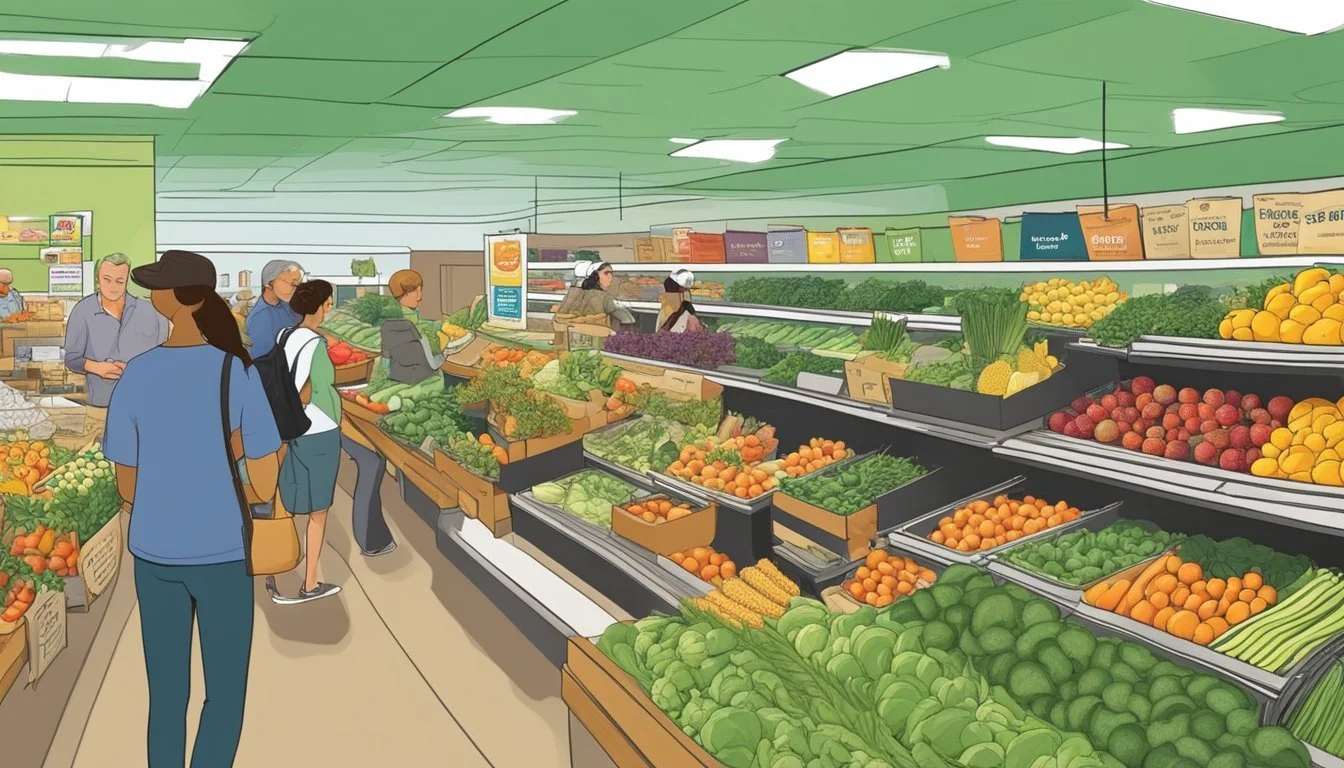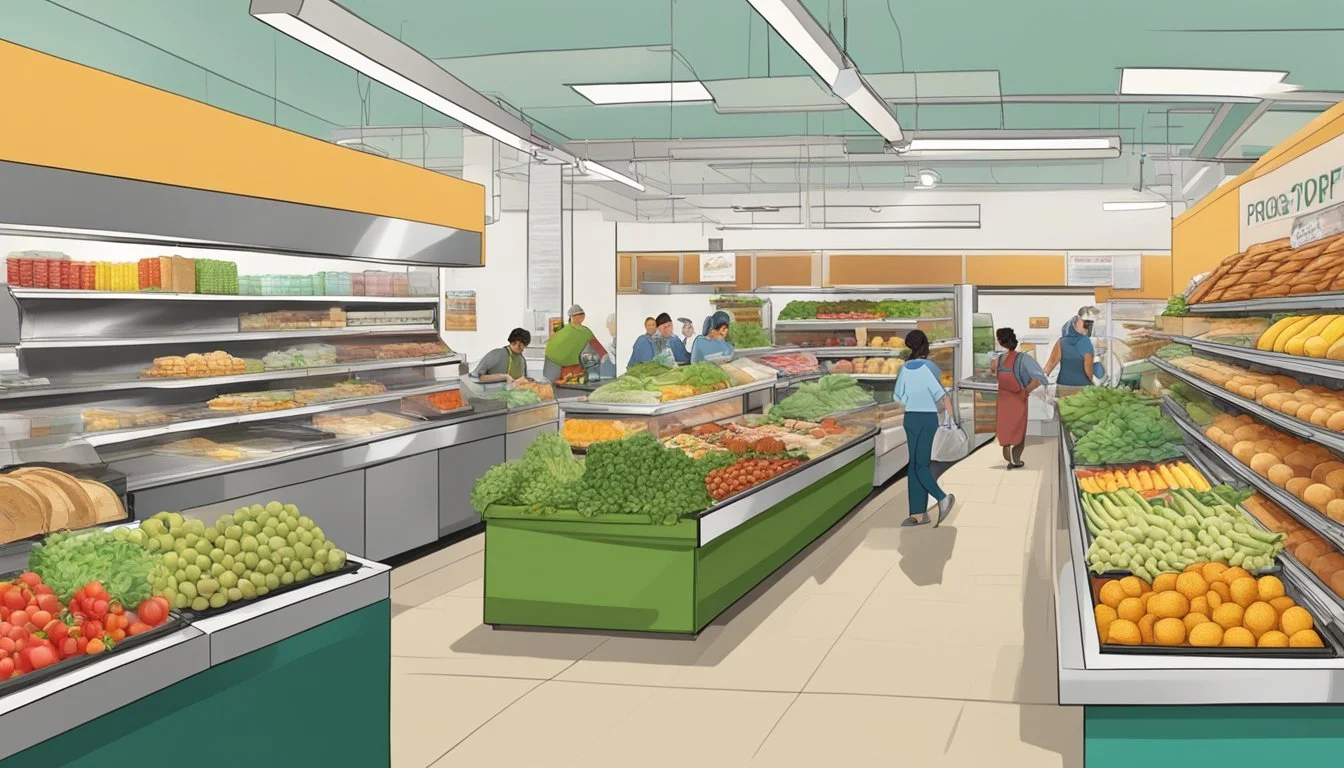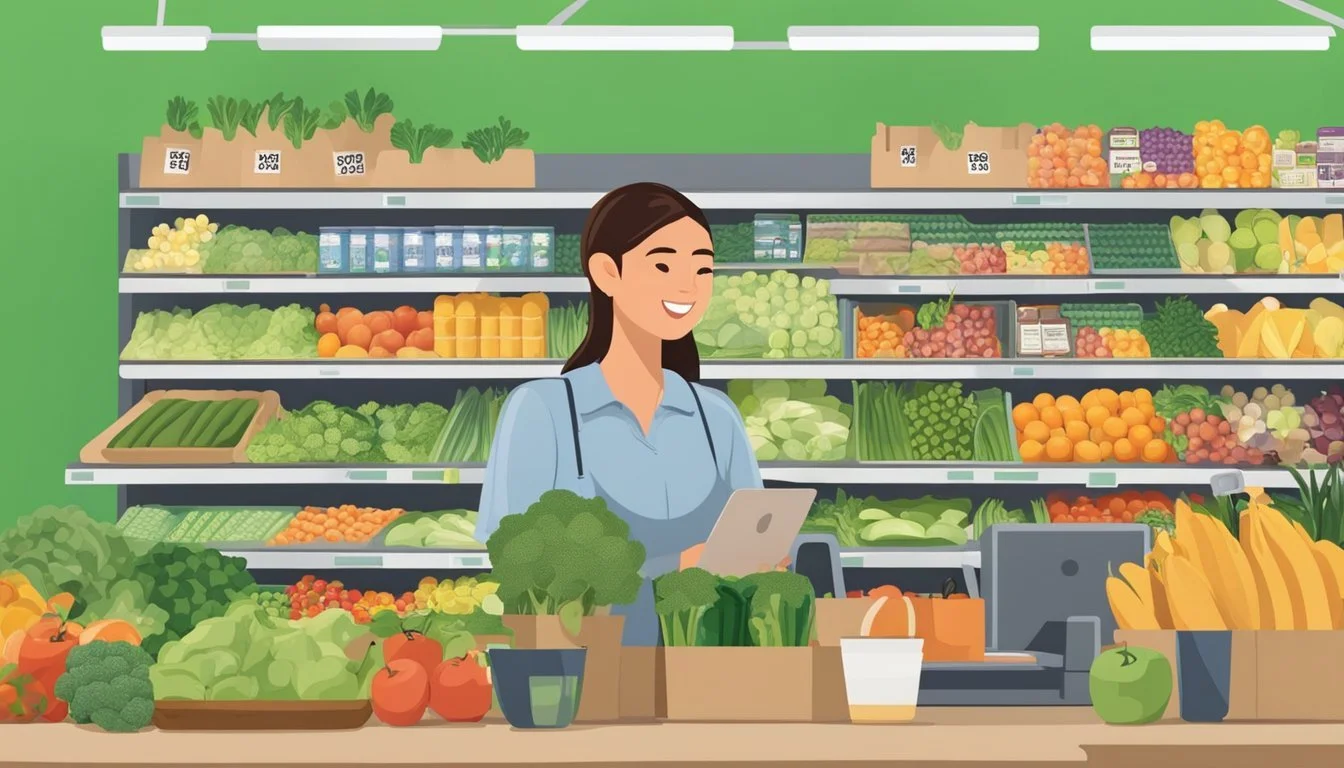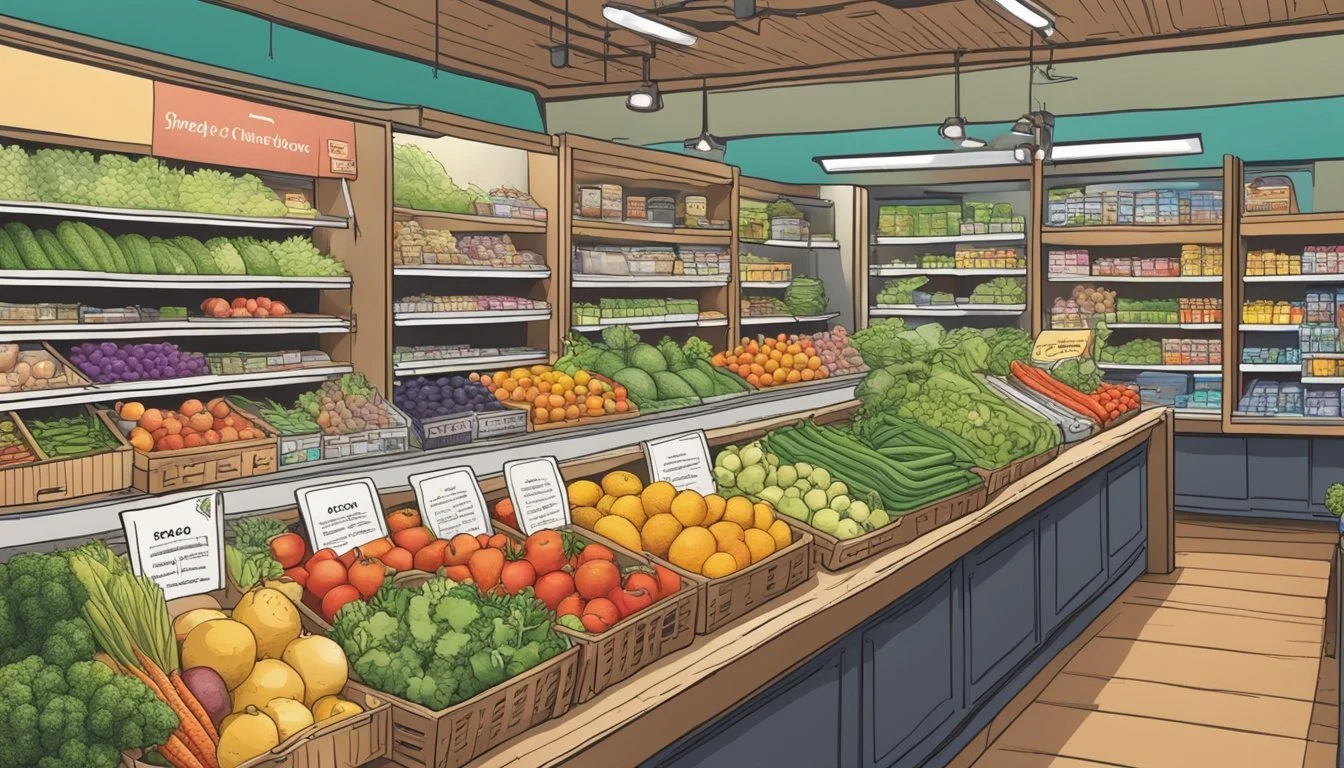Guide to Food Co-Ops in Albuquerque, NM
Your Essential Resource
Food cooperatives, colloquially known as food co-ops, have increasingly become pillars of community and local commerce in cities like Albuquerque, New Mexico. Offering a wide selection of local and organic products, these member-owned retail establishments operate on a cooperative model that prioritizes sustainable food systems and community development over profit. Shoppers in Albuquerque can participate in a unique and community-centered grocery shopping experience where they contribute not just to their health but also to the local economy.
La Montañita Co-op stands out as a key player in the Albuquerque food scene, with multiple locations across the city, including the popular Nob Hill and North Valley areas. This co-op is celebrated for its exceptional range of fresh, organic produce and a selection of groceries that cater to various dietary preferences. Its dedication to local producers fosters a close-knit connection between farmers and consumers while encouraging environmentally responsible practices.
The impact of food co-ops goes beyond providing quality food; they strive to educate the community on the value of sustainable living and create a space where everyone is welcome. Through regular sales, inclusive events, and cooperative governance, residents of Albuquerque are empowered to shape the food landscape of their city, promoting health, economy, and togetherness.
What Are Food Co-Ops?
Food co-ops, or cooperatives, in Albuquerque, NM, serve as economic alternatives to traditional supermarkets by emphasizing community engagement, democratic member control, and local economic participation.
Defining a Cooperative
A cooperative, or co-op, is a collectively owned enterprise focused on meeting the shared economic, social, and cultural needs of its members. Unlike profit-driven businesses, a food co-op prioritizes the welfare of the community it serves, promoting local sourcing and healthy food accessibility. Each member has an equal say in decision-making, adhering to democratic principles that guide the operation of the cooperative.
Principles of Co-Ops
Cooperatives operate based on several guiding principles that help maintain their unique structure and objectives:
Open and Voluntary Membership: Co-ops are open to all individuals willing to accept the responsibilities of membership without gender, social, racial, political, or religious discrimination.
Democratic Member Control: One member, one vote. Control is vested in the co-op's members, who actively participate in setting policies and making decisions.
Members' Economic Participation: Members contribute equitably to, and democratically control, the capital of the cooperative. They usually receive limited compensation, if any, on capital invested as a condition of membership.
Autonomy and Independence: Co-ops are independent, self-help organizations controlled by their members. When entering into agreements with other organizations or raising capital from external sources, co-ops ensure democratic control by members and maintain their cooperative autonomy.
Education, Training, and Information: Cooperatives provide education and training for their members, elected representatives, managers, and employees so they can contribute effectively to the development of their co-ops. They inform the general public about the nature and benefits of cooperation.
Cooperation among Cooperatives: Co-ops serve their members most effectively and strengthen the cooperative movement by working together through local, national, regional, and international structures.
Concern for Community: Cooperatives work for the sustainable development of their communities through policies approved by their members.
By upholding these principles, food co-ops in Albuquerque foster a sense of collaboration and ensure that economic benefits stay within local communities, fostering sustainable growth and community enrichment.
Benefits of Joining a Food Co-Op
When residents of Albuquerque join a food co-op, they gain access to a myriad of benefits ranging from economic advantages to improved health and active community involvement. These cooperatives are not just stores but community-based non-profit organizations that prioritize a sustainable future.
Economic Advantages
Members of food co-ops typically experience significant economic benefits. Because these co-ops are member-owned, any profits are often returned to members in the form of rebates or invested back into the co-op to improve services. The local economy also benefits as food co-ops support:
Local farmers and producers: By purchasing directly from them, co-ops keep money circulating within the community.
Job creation: Co-ops provide employment opportunities that contribute to a strong local economy.
Fair Pricing: Members usually benefit from better prices due to collective buying power.
Health and Sustainability
Food co-ops focus on offering healthy food options and promoting sound environmental practices. They typically provide:
Access to nutritious food: Including organic, non-GMO, and locally sourced products that support a healthy diet.
Environmental impact: Co-ops often follow sustainable practices, like minimal packaging and supporting local agriculture, reducing food miles and carbon footprints.
Community Involvement
By participating in a food co-op, members play a crucial role in community development. They foster:
Member participation: As a democratic entity, each member has a voice in the decisions and direction of the co-op.
Educational outreach: Many food co-ops host workshops and events to improve community knowledge about healthy lifestyles and sustainable living.
Non-profit engagement: Co-ops typically collaborate with local non-profits to strengthen community initiatives.
Guide to Albuquerque's Food Co-Ops
Food cooperatives in Albuquerque offer a unique shopping experience focused on local, organic products. They contribute significantly to the local economy and emphasize sustainable environmental practices.
La Montañita Co-Op
La Montañita Co-op, established in 1976, plays a pivotal role in Central New Mexico's community by providing access to local and organic food. This co-op operates several locations, including a notable one in the Nob Hill area, ensuring shoppers have convenient access to health-conscious products.
Locations within Albuquerque:
Nob Hill: Central location with a wide range of organic produce and groceries.
Rio Grande: A community-owned hub for local food distribution.
Key Features:
Weekly Sales: Discounts on a variety of items every Wednesday.
Open to All: Non-members can shop but members receive additional benefits.
Other Local Co-Ops
While La Montañita is the most prominent food co-op in Albuquerque, there are other local co-ops that contribute to the community's access to local, organic food. These cooperatives often focus on fostering a strong local economy and providing customers with high-quality, environmentally friendly food options.
Aspects of Local Co-Ops:
Focus on Local Food: Prioritizing the sale of products from local producers and farmers.
Community Involvement: Acting as centers for the community to engage in food-related events and education.
By supporting these co-ops, residents of Albuquerque can enjoy fresh, organic products while simultaneously bolstering the local economy and practicing environmentally sustainable habits.
Understanding Membership
Food cooperatives in Albuquerque offer a unique opportunity for consumers to take an active role in their local food system. Members benefit from discounts, contribute to a fair trade and GMO-free marketplace, and can participate in various member-financed programs.
How to Become a Member
Individuals interested in becoming a member of a food co-op in Albuquerque typically must pay an annual membership fee or opt for a lifetime membership. For instance, La Montañita Co-op offers an annual membership at $15 per household, which generally includes up to three adults sharing a kitchen, or a lifetime membership priced at $200.
Fill Out an Application: Potential members need to provide basic member information through a form.
Payment of Dues: Fees for membership must be paid upfront.
Activation: Once the application is processed and dues are paid, membership benefits begin.
Membership Benefits
Membership in a food co-op offers several tangible and community-focused benefits.
Discounts: Members are eligible to receive discounts on purchases, which can range from 15 to 20 percent depending on the co-op’s policies.
Member-Financed Loans: Some co-ops allow members to participate in member-financed loans, reinvesting in their community.
Supporting Fair Trade: Members contribute to the fair trade movement by electing to shop for products that adhere to fair trade principles.
GMO-Free Options: Co-ops often prioritize stocking GMO-free products, aligning with member preferences for natural and organic food choices.
Shopping at Co-Ops
When shopping at food co-ops in Albuquerque, NM, patrons can anticipate a community-oriented experience with a focus on local and organic goods.
What to Expect
Individuals who choose to shop at co-ops can expect a warm, community-centered environment. Co-ops are typically owned and operated by local members, and they emphasize sustainability and ethical business practices. Shoppers can interact with staff who are knowledgeable about their products and invested in the store's mission. They may also find community boards or areas dedicated to local events and causes, reinforcing the co-op’s role as a community hub.
Product Selection
At Albuquerque food co-ops, the product selection emphasizes local, fresh, and organic foods. Shoppers can find a range of groceries, including:
Fresh Produce: A variety of vegetables and fruits, often sourced from regional farmers.
Deli: In-house prepared foods that can include sandwiches, salads, and ready-to-eat meals.
Natural Foods: A wide selection of grocery items that are organic, non-GMO, and free from artificial additives.
Local Products: Goods made locally ranging from honey and dairy to arts and crafts, which support nearby artisans and producers.
Each aisle provides informational tags to help consumers make informed choices about the foods they purchase, including the origin of products and whether they are organic, gluten-free, or sustainably sourced.
Contributing to the Local Economy
In Albuquerque, NM, food cooperatives serve as critical economic engines, bolstering the local economy by supporting small-scale food producers and promoting sustainable trade practices. These cooperatives not only facilitate fair commerce but also reinvest in the regional community, enhancing economic stability.
Supporting Local Farmers and Ranchers
Food cooperatives, specifically those that operate a cooperative distribution center, play a vital role in maintaining the economic vitality of New Mexico farmers and ranchers. The La Montañita Co-op Distribution Center, for instance, purchases food directly from approximately 300 New Mexican agriculturalists, encompassing both farmers and ranchers. This direct buying relationship ensures that more profits return to the producers themselves, supporting the local agricultural economy.
Local Impact: A significant $5.1 million is spent on New Mexico-produced food and grocery items.
Direct Contributions: These expenditures directly contribute an estimated $4,905,154 to New Mexico's economy.
By prioritizing local produce, cooperatives help keep the supply chain regional, reducing transportation costs and environmental impact while fostering local employment and economic growth.
Promoting Fair and Direct Trade
Community-owned grocery stores such as the La Montañita Co-op are cornerstones for fair and direct trade within the local food system. These establishments champion fair trade principles by offering products that ensure fair wages and conditions for workers and producers.
Fair Trade Commitment: Commitment to promoting products that adhere to fair trade standards, supporting ethical and responsible sourcing.
Direct Trade Relationships: Cultivating direct relationships with local and international producers to guarantee transparency and fairness in the trade process.
Through these commitments, cooperatives like La Montañita not only enhance Albuquerque's local economy but also contribute positively to the global trade system, ensuring that small-scale food producers, both within and outside of New Mexico, are supported and valued.
Educational Resources and Community Events
Food cooperatives in Albuquerque offer a wealth of opportunities for learning and community engagement. These include hands-on workshops and comprehensive community outreach programs aimed at promoting sustainable food systems and cooperative economics.
Workshops and Training Sessions
La Montañita Co-op has a tradition of offering educational workshops that provide participants with practical skills in food preparation and sustainable living. One can find sessions on cooking with organic produce, which often includes recipes that highlight local ingredients. Furthermore, training sessions focusing on the economic principles of cooperatives help to foster a deeper understanding of community-based business models.
Community Outreach
Community outreach initiatives by La Montañita include the La Montañita Fund — a grant program aimed at strengthening local food systems and cooperatives through financial support. They disseminate valuable information through a monthly newsletter, which not only keeps the community informed about co-op resources but also offers literature on food and agriculture. The newsletter serves as a platform for connecting consumers with local farmers and artisans, further embedding the co-op within the community fabric.
Co-Op Dining and Prepared Foods
Co-op dining in Albuquerque offers an exceptional array of prepared foods, ranging from local specialties to catering services that can suit any event. Patrons can expect both quality and creativity from the offerings, with a strong emphasis on health-conscious cuisine.
Deli Services
The deli section at local Albuquerque co-ops provides a diverse menu, catering to a variety of dietary preferences with a focus on organic and locally-sourced ingredients. Customers can find an assortment of daily specials that often include vegan and gluten-free options. Deli services also extend to catering, ready to accommodate gatherings of any size with a menu that boasts Mexican fare alongside contemporary American dishes.
Daily Options:
Vegan/Gluten-Free Choices
Seasonal Specials
Catering:
Customizable Menus
Local & Organic Focus
Meet the Deli Chefs
The deli chefs behind Albuquerque's co-op dining are passionate culinary professionals dedicated to sustainability and community health. They bring a blend of expertise and innovation to the table, often drawing from New Mexico's rich culinary tradition to infuse local flavors, such as native chiles, into their creations. These chefs are integral to the community, fostering an environment that not only serves food but also educates consumers about the benefits of organic eating and locally sourced produce.
Operational Insights
In Albuquerque, NM, food co-ops operate with a community-focused approach, offering a symbiotic relationship between local suppliers and consumers. These co-ops are not just retail outlets but form a fundamental part of the community's economic and social fabric.
Store Hours and Locations
La Montañita Co-op has a significant presence in Albuquerque with its organized structure and welcoming environment. Store hours are typically suited to accommodate the schedules of most consumers, often open seven days a week.
Store Hours:
Monday to Friday: 7 AM - 10 PM
Saturday to Sunday: 8 AM - 10 PM
Locations:
Main Store: 3500 Central Ave SE, Albuquerque, NM 87106
Distribution Center: 3361 Columbia Dr. NE, Albuquerque, NM 87107
La Montañita Co-op provides a wide array of locally sourced products, making it a one-stop destination for organic and exceptional food items.
Meet the General Manager
The General Manager at La Montañita Co-op serves as a pivotal figure in the everyday operations and strategic direction of the co-op. The manager embodies the cooperative principles and works closely with local producers and community members.
General Manager: Elizabeth Johnson
Tenure: Elizabeth has been leading the team with prodigious dedication for over five years.
Contact: Via the main store, for inquiries or suggestions related to co-op operations or community engagement initiatives.
Elizabeth ensures that the co-op maintains its commitment to local growers and sustains its service to the community while upholding cooperative values.
Engaging with the Co-Op Online
As consumers increasingly turn to digital platforms for their shopping needs, Albuquerque food co-ops have made valuable information and community engagement opportunities accessible online. This enhances convenience for both prospective and current members.
Online Resources
Co-Ops in Albuquerque offer a wealth of online resources for members and the general public. Member information, detailing the benefits and responsibilities of co-op membership, is readily available on their official websites. Additionally, individuals looking to shop for local and organic products can find delivery options directly through the co-op's online portal, which often features an array of goods similar to what one would find in-store.
For instance, La Montañita Co-op offers an online experience where consumers can explore products and learn about the source and quality of the offerings. The co-op's focus on healthy food, environmental sustainability, and a strong local economy is prominently featured on their online platform, aligning with their established brand presence in physical locations.
Social Media and Reviews
Social media platforms serve as a vibrant space for customers to engage with Albuquerque co-ops, share experiences, and post reviews. Platforms like Yelp are frequently used by consumers to write a review, offering insights and feedback that can sway potential customers while helping businesses elevate their service.
Facebook & Twitter: Regular updates, event notifications, and special promotions are shared, fostering a sense of community and keeping followers informed.
Instagram: Visually engages with followers through images of fresh produce, upcoming community events, and co-op news.
Engagement through social media often reflects the co-op's ethos, emphasizing collaborative community relationships, and transparency about their food sources. It also serves as a fast and direct line of communication between co-ops and their members, encouraging an ongoing dialogue about products, services, and co-op developments.
Additional Services and Offerings
Food co-ops in Albuquerque provide more than just grocery shopping; they offer a range of services and specials that cater to the community's needs. Members can benefit from special deals and partake in customized catering services for their events.
Special Deals and Discounts
Members of Albuquerque's food co-ops can enjoy exclusive specials and discounts. Co-ops typically offer:
Weekly Deals: Special prices on a variety of products from produce to bulk foods.
Member Discounts: Additional savings for co-op members, which may include:
Birthday Discounts: A percentage off your purchase on your birthday.
Case Discounts: Reduced prices when buying in bulk by the case.
Catering and Special Orders
For those who are hosting events or desire bespoke food options, some Albuquerque co-ops provide catering services and special order possibilities. They typically feature:
Local Ingredients: Utilizing locally sourced and organic produce in their catering menus.
Customizable Options: The ability to tailor orders to specific dietary needs or preferences.
Food co-ops have established themselves as versatile and community-oriented, offering these additional services to meet the diversified demands of Albuquerque's residences and organizations.
Future of Food Co-Ops in Albuquerque
Food co-ops in Albuquerque are expected to play a pivotal role in the enhancement and sustainability of regional food systems. Their commitment to local, fresh produce and the strengthening of local food systems aligns with broader environmental and economic goals.
Expanding the Co-Op Network
The expansion of Albuquerque's food co-op network is imperative to meet the growing demand for regional and fresh foods. La Montañita Co-op, for instance, exemplifies this growth with efforts to increase their distribution channels and community outreach. A strategic increase in the number of co-op locations and partnerships with local farmers will provide easier access to high-quality, locally-sourced food.
Objective 1: Establish more co-op outlets within Albuquerque.
Objective 2: Strengthen relationships with local producers.
Objective 3: Enhance distribution systems to efficiently connect food sources with consumers.
Advancing Local Food Systems
Advancements in Albuquerque's local food systems require concerted effort to bolster sustainability and diversity. The emphasis on sourcing local foods not only supports Albuquerque's economy but also ensures a reduced carbon footprint associated with food transportation. The Rio Grande Valley, a fertile area that supports a myriad of produce, is crucial in this advancement.
Key points to consider for advancing local food systems:
Educating Consumers: Enhance awareness and knowledge about the benefits of local, fresh produce.
Supporting Local Farmers: Facilitate more significant support systems and incentives for farmers to cater to local markets.
Infrastructure Investment: Invest in infrastructure that enables efficient food distribution and addresses food insecurity in the community.
FAQs and Member Support
This section addresses frequently asked questions and provides essential information on member support options for food co-ops in Albuquerque, NM.
Common Questions
What are the benefits of becoming a member of a food co-op in Albuquerque? Members typically enjoy benefits like discounts on products, voting rights on co-op matters, and a share in the profits. The co-op distribution center ensures fresh, local products are available.
How are food co-ops in Albuquerque different from regular grocery stores? Food co-ops operate on principles that prioritize community, sustainability, and supporting the local economy. Staff often have a deeper connection with both producers and consumers.
Contact and Help
For immediate assistance:
Phone: Reach out to your local co-op's customer service desk during business hours.
In-person: Staff members at any Albuquerque co-op location can offer help and take in membership applications.
For non-urgent inquiries:
Email: Each co-op typically provides an email address for inquiries, available on their official website.
Contact Form: A contact form is often available on the co-op's website for convenience.
Concluding Thoughts
Food co-ops in Albuquerque embrace autonomy and independence, allowing community members to partake in a unique shopping experience that embodies shared values. These co-ops often operate with the broader concern for community well-being at their core. By supporting local producers and educational initiatives, they contribute significantly to a sustainable future.
They prioritize:
Local sourcing: Ensures a smaller carbon footprint and promotes local economy.
Community programs: Engage members and non-members in educational and social activities.
Environmental sustainability: Reducing waste through various green practices.
Patronizing these co-ops means investing in:
Community empowerment
Healthy food options
Sustainable practices
Shoppers can enjoy the benefits of member ownership, but non-members are also welcome, ensuring that the co-ops' emphasis on inclusivity and community support extends beyond their membership base. The cooperative model provides an alternative that aligns consumer habits with a positive impact on society, echoing a commitment to both present needs and future considerations.
Remember, the choice to shop at a food co-op is a conscious step towards fostering a community-centric market, one where every purchase helps thread together the fabric of a resilient, interconnected Albuquerque.

